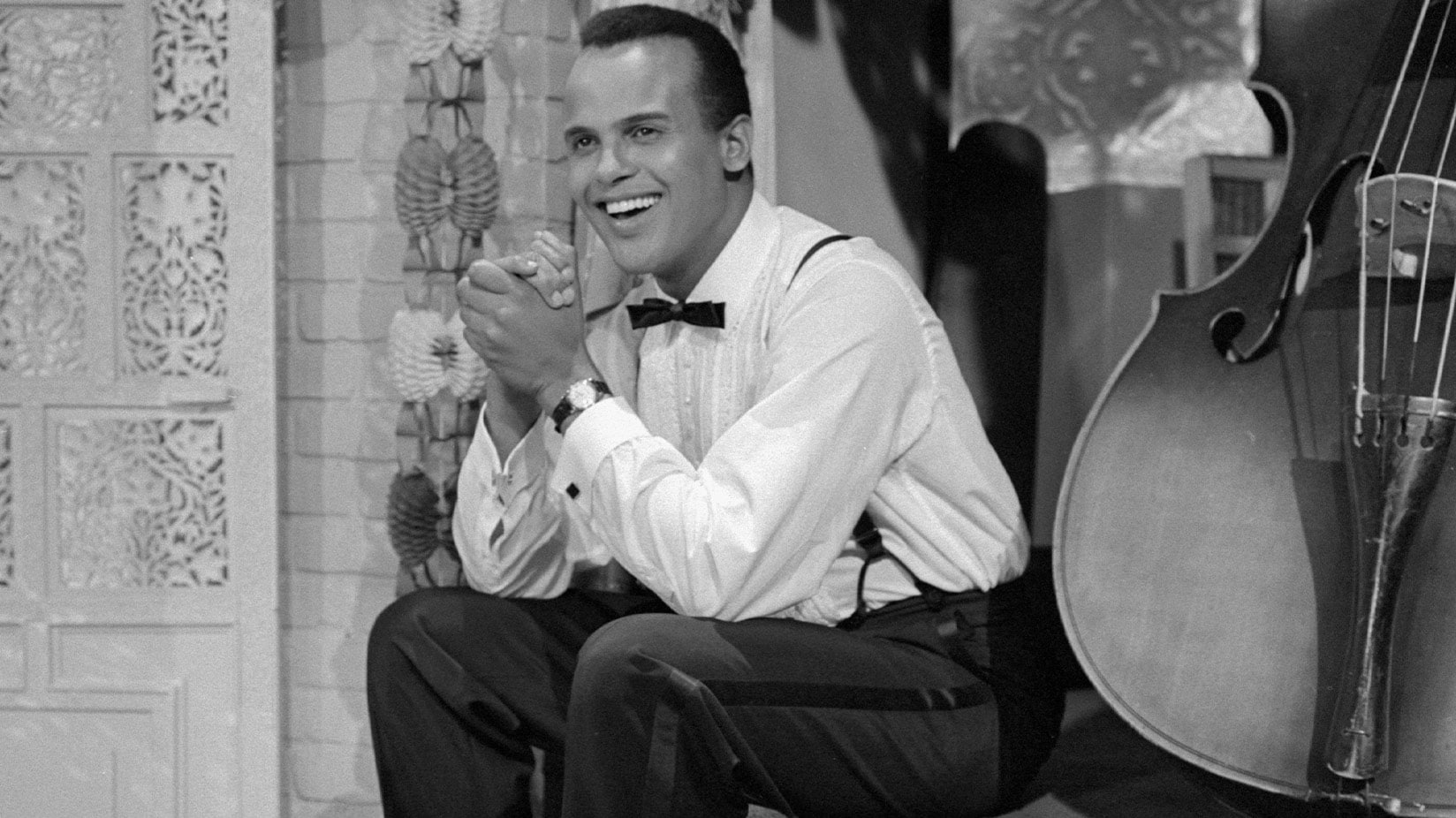Sunday November 19 | 2 Films
Harry Belafonte (March 1, 1927-April 25, 2023) pioneered Black representation in music, film, television, theatre and politics. He was born in Harlem, New York, the son of an Afro-Caribbean father (from either Martinique or Jamaica) and a Scottish-Jamaican mother. Taking pride in his Caribbean roots, Belafonte popularized calypso music among international audiences in the 1950s and 1960s with his recordings “Day-O (The Banana Boat Song)” and “Jump in the Line (Shake, Senora)” (both memorably used in Tim Burton’s 1988 film, Beetlejuice). He won two Grammy Awards for the albums Swing Dat Hammer (1960) and An Evening with Belafonte/Makeba (1965); the latter covered the political plight of Black South Africans under apartheid. He went on to win a Grammy Lifetime Achievement Award.
As an actor, he starred in films such as Carmen Jones (1954), Island in the Sun (1957) and Buck and the Preacher (1972); he received the Oscar statuette for the Jean Hersholt Humanitarian Award in 2015. He also had an illustrious television career, becoming the first Jamaican-American to win an Emmy for Revlon Revue: Tonight with Belafonte (1959). On the stage, he won a Tony for his performance in John Murray Anderson’s Almanac. Having received awards at all four major genre ceremonies, Belafonte was an EGOT (Emmy, Grammy, Oscar and Tony awards) honoree.
Belafonte was also well-known as a vocal civil rights advocate. He was inspired by his mentor, fellow singer, actor and activist Paul Robeson who opposed racial prejudice both in the United States and colonialism throughout Africa. Belafonte followed Robeson’s model, refusing to perform in the American South from 1954-1961in protest of Jim Crow segregation. He was also one of Martin Luther King, Jr.’s confidants. This month, TCM screens two of his films, Carmen Jones and The World, the Flesh and the Devil (1959), in memoriam of his prolific and influential career.
Belafonte’s first film role was in Bright Road (1953), in which he supported Dorothy Dandridge who played the female lead. The two went on to star in Otto Preminger’s hit Carmen Jones, an all-Black cast modernized film adaptation of Georges Bizet’s most famous opera, Carmen. Set during World War II, it tells the story of young, free spirited parachute maker and “hot bundle” Carmen Jones (Dandridge), whose beauty is the object of many men’s desires. However, Carmen only has eyes for young army officer Joe (Belafonte) though he’s under orders to deliver her to the authorities for starting a fight at work.
Carmen Jones was a throwback to the all-Black “race films” made in Hollywood from the 1910s-1940s, a refreshing redux given the dearth of Black representation onscreen in the 1950s. As Bosley Crowther lamented in his New York Times review of the film, audiences at the time of Carmen Jones’ release would be hard pressed to “name a dozen” films with Black actors in leading roles. And yet, despite its representational gains and overall box office success, Carmen Jones was punctuated with controversy, particularly around the choice to dub both Belafonte and Dandridge’s singing although they were incredibly talented and popular vocalists. Belafonte’s singing was dubbed by LeVern Hutcherson (an African American actor known for his Broadway performances in Carmen Jones), and Dandridge was dubbed by Marilyn Horne (a white American mezzo-soprano opera singer). While the dubbing of an actor’s singing voice was not unusual in Hollywood films, especially in that era, Crowther criticized the decision in the case of Carmen Jones, writing, “the neglect of such a reservoir of talent seems both a waste and a shame.” According to Crowther and other film critics, erasing the singing voices of Belafonte and Dandridge undermines the film’s representational significance for Black performers. Nevertheless, the film catapulted Belafonte’s acting career and had audiences pining for his calypso recordings.
Ranald MacDougall’s ambitious The World, the Flesh and the Devil combines the post-apocalyptic science fiction film with the social problem film to espouse an anti-segregationist agenda. It is loosely based on the 1901 novel The Purple Cloud by M.P. Shiel and the story “End of the World” by Ferdinand Reyher. It also dovetails in many ways with Ralph Ellison’s 1952 novel, Invisible Man. The film stars Belafonte as Black mine inspector Ralph Burton who gets trapped underground during a cave collapse in Pennsylvania. He digs his way out after several days to discover the world depopulated due to a nuclear blast that has destroyed earth leaving him as one of its sole human survivors. After making his way to New York City, he encounters Sarah Crandall (Inger Stevens), a young, single, white woman. Issues of race and the prospect of (then illegal) interracial romance loom over their encounter. The bigotry of a third survivor, Ben Thacker (Mel Ferrer) works to complicate Ralph and Sarah’s potential relationship.
The World, the Flesh and the Devil was the first film that Belafonte’s production company, HarBel Productions, helped to co-produce. With HarBel, Belafonte hoped to make films that would depict African American experiences and promote African American presence in Hollywood filmmaking. However, the ending of the film was reshot multiple times leading all three co-stars, Belafonte, Stevens and Ferrer, to complain to co-producer Sol. C. Siegel that they were concerned by the final racial message of the movie. And indeed, critics felt let down by its alleged failure to solve any racial conflicts. Eager for a punchy film that would capture the firm political stances of the Civil Rights Movement, they complained that the messaging was left ambiguous at best and, as Crowther wrote, unrealistically over-idealized at worst. Be that as it may, The World, the Flesh and the Devil has had a direct impact on other post-apocalyptic social problem films featuring Black male leads such as George A. Romero’s Night of the Living Dead (1968) starring Duane Jones and Francis Lawrence’s I Am Legend (2007) starring Will Smith.














